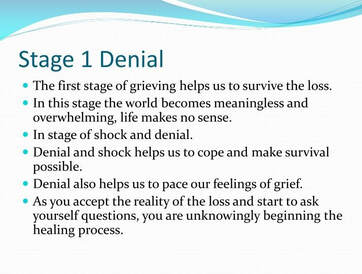 Devastating news. A family member or dear friend has died. You don’t want to believe it and it doesn’t even feel real. A tangle of emotions hits you and everything else seems unimportant. You feel lost, confused, and you just want to curl up in a ball. The feelings - the thoughts - are common. Yet if you linger in a state of denial for too long, you might find it hard to move forward and ultimately cope with your loss. Understand the Denial Stage Denial can serve as a protective mechanism that stops us from the very real process of grief. It may be comforting to think that the person is just taking a break or that they’ll be back. Some people go through denial so they can go on with their lives and stop thinking about what has happened. And of course, we all want to be as helpful as we can to those who have lost someone. Some people choose to stay in denial for longer than others. Many people find themselves in denial for several months, perhaps a year or longer. Why do some people stay in denial longer than others? The purpose of denial is to protect ourselves. By maintaining a distance from the loss, we are less likely to experience the actual pain. Recognize your feelings The first step to accepting and processing a loss is to acknowledge and name what you’re feeling. There’s no getting away from your feelings; it’s part of the process. If you are unsure what you’re feeling or what your reaction should be, ask yourself, “Am I thinking this because it’s true, or am I just guessing based on my past experience?” For instance, if a loved one died in an accident, your first reaction may be one of anger and frustration. Your anger and frustration can be minimized by acknowledging that this is what you’re experiencing. Accept the reality of the situation Here is the fundamental truth: Death is very real. It happens all the time, to everyone, including you. You have to accept it. You have to take the steps to begin the healing process. You have to let go of the denial. Accepting reality allows you to fully grieve and to begin to accept your loss. It makes you more likely to move on, even if it takes time. Denial can feel like it keeps you from facing reality, as if you are in a protective bubble. It can also be paralyzing to contemplate your grief. The truth is: You can’t just decide to stop grieving, but you can learn how to manage it. It is more about how you manage yourself than the actual situation. Find a support system The initial loss of a loved one can be deeply isolating. There are many support networks that you can tap into to help you heal after your loss. There are grief support groups, friends and family members who will sit with you and hold you in their arms. There are telephone helplines and online communities where you can find emotional and practical support. Grieving is a personal journey. People grieve in different ways. Some will withdraw from friends and family; others will seek out social interaction. Others may seek counselling and spiritual guidance. Still others might move in a different direction. Continue to be active in your community Mourning a loved one may take you into a period of time that feels disconnected from your daily activities. Conclusion It takes a lot of work and most people need more than a few weeks to reach acceptance. It helps to talk about it with friends and family. They can help you develop a plan to get through this painful time. How long will it take for you to get over the loss of a loved one? If you think this is something you need to do, you can discuss it with a psychologist or counselor. ----------- You may not be in need of a eulogy writer right now, but it's likely that you'll eventually lose a loved one. We can help make the occasion easier by writing a wonderful tribute to them that captures their life and passions. Please keep us in mind. TheEulogyWriters.com
0 Comments
Your comment will be posted after it is approved.
Leave a Reply. |
Archives
July 2024
AuthorSteve Schafer is the founder of TheEulogyWriters and the author of hundreds of heartfelt, wonderful eulogies. He lives in Texas and has been writing eulogies for well over thirty years. The articles in this blog are designed to help people through the process of losing loved ones and exploring issues in the aging process. |
|
The Eulogy Writers
4092 Old Dominion Dr. West Bloomfield, MI 48323 |
Writers: Steve Schafer, Ralph DiBiasio-Snyder, Abi Galeas, Miriam Hill
Steve's Personal Cell Phone: (734) 846-3072 Our email address is: [email protected] |